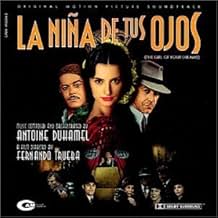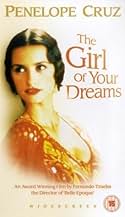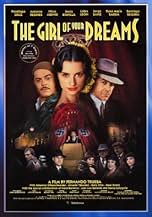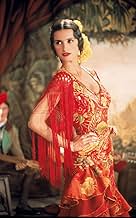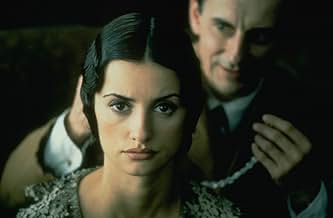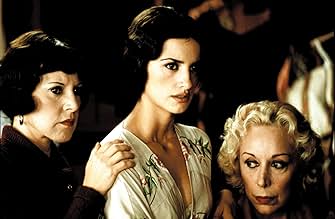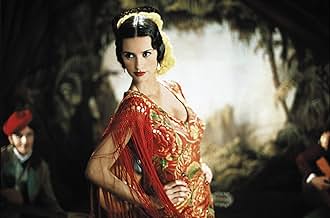IMDb-BEWERTUNG
6,7/10
4649
IHRE BEWERTUNG
Füge eine Handlung in deiner Sprache hinzuA company of Spanish movie makers leaves Franco's Spain and moves to Hitler's Germany to produce a film. Problems soon arise.A company of Spanish movie makers leaves Franco's Spain and moves to Hitler's Germany to produce a film. Problems soon arise.A company of Spanish movie makers leaves Franco's Spain and moves to Hitler's Germany to produce a film. Problems soon arise.
- Auszeichnungen
- 14 Gewinne & 16 Nominierungen insgesamt
Rosa Maria Sardà
- Rosa Rosales
- (as Rosa María Sardá)
Miroslav Táborský
- Václav
- (as Mirosláv Táborský)
Juan Luis Galiardo
- Embajador
- (as Juan Luís Galiardo)
Jan Preucil
- Maisch
- (as Jan Přeučil)
Borivoj Navrátil
- Henkel
- (as Bořivoj Navrátil)
Empfohlene Bewertungen
With a wonderful cast, including the divine Penélope Cruz, this movie is the best Spanish movie of 1998. As a humorous approach to Spanish actors working in Hitler´s Germany, it provides the spectator with large quantities of laughs, as well as with very touching scenes.
A rather unusual Spanish film, to say the least: an Andalucían theatre group go to Nazi Germany to make a film and get swallowed up in all the nasty things going on there, which in itself is rather cute, given all the nasty things that had been going on back in Spain.
The mixture of drama with a quizzical farcical touch of Spanish black humour thrown in does not quite work with me, I'm afraid. Fernando Trueba, as ever, has done his job well. The scene-setting is truly exceptional; the dialogues at times are really good but at others tend to jar on the ear making me wonder if this is the same Rafael Azcona (Logroño, 1926) as in other far better scripts; and hearing Penélope Cruz with an Andalucían accent is definitely something not to be missed at any price .!! Oh, she's from Madrid, by the way, and that city has its own dialect. I've never had much sympathy for Antonio Resines, despite having to acknowledge that in this film he is pretty good and I should say the same of Loles León who I have seen a few times in very trivial TV paraphernalia. Rosa María Sardá is of course splendid, her live-theatre upbringing lending a good hand to the occasion.
So the ingredients are more or less right, but the whole just does not convince me; perhaps the story-line, perhaps the rather strange sense of humour in bizarre situations...
Well, never mind: Penelope Cruz is `La Niña de Mis Ojos' (The Girl of My Eyes) whenever and wherever she pops up, which, thank goodness, is nice and frequent.
The Spanish spoken is rather difficult and so is for people at an advanced level; otherwise the film should be seen dubbed or with subtitles.
The mixture of drama with a quizzical farcical touch of Spanish black humour thrown in does not quite work with me, I'm afraid. Fernando Trueba, as ever, has done his job well. The scene-setting is truly exceptional; the dialogues at times are really good but at others tend to jar on the ear making me wonder if this is the same Rafael Azcona (Logroño, 1926) as in other far better scripts; and hearing Penélope Cruz with an Andalucían accent is definitely something not to be missed at any price .!! Oh, she's from Madrid, by the way, and that city has its own dialect. I've never had much sympathy for Antonio Resines, despite having to acknowledge that in this film he is pretty good and I should say the same of Loles León who I have seen a few times in very trivial TV paraphernalia. Rosa María Sardá is of course splendid, her live-theatre upbringing lending a good hand to the occasion.
So the ingredients are more or less right, but the whole just does not convince me; perhaps the story-line, perhaps the rather strange sense of humour in bizarre situations...
Well, never mind: Penelope Cruz is `La Niña de Mis Ojos' (The Girl of My Eyes) whenever and wherever she pops up, which, thank goodness, is nice and frequent.
The Spanish spoken is rather difficult and so is for people at an advanced level; otherwise the film should be seen dubbed or with subtitles.
Penelope Cruz is so good in this movie she carries it; you really want to see what happens next. She has some great musical numbers and some excellent dramatic scenes. I also found the set design and scenery superior, as well as just the visuals who contrast the small, swarthy Spaniards against the Aryan ideal. The DVD I rented had two versions, in Castillian Spanish and Mexican Spanish, with English sub-titles, which was interesting when the characters spoke in German, as that was not translated unless a translator actually did it in the film. Actually there was even a little Russian. The supporting cast gets a little slapstick at times, but I found the film well worth it as a Cruz vehicle--she is quite a beautiful actress. 8/10.
I have just got this film on DVD I saw it a couple of years ago during a Penelope Cruz season in Manchester, I enjoyed it then & I enjoyed it just as much now.
As a non-Spanish speaker I still got the comic elements & the historical references to a point & now I have it on DVD I can go back & check any bits I have missed.
I just like the characters in this film, the fish out of water element of the Spanish in Nazi Germany is very funny the off the cuff one liners are priceless.
Cruz & Resinas may be the focus of the film & they are lead the way but everyone gets a moment to shine in this film, segura is my favourite he always steals some or all the limelight in any film he appears.
I would heartily recommend this film it may not be up to Belle Epoque but its not far behind.
As a non-Spanish speaker I still got the comic elements & the historical references to a point & now I have it on DVD I can go back & check any bits I have missed.
I just like the characters in this film, the fish out of water element of the Spanish in Nazi Germany is very funny the off the cuff one liners are priceless.
Cruz & Resinas may be the focus of the film & they are lead the way but everyone gets a moment to shine in this film, segura is my favourite he always steals some or all the limelight in any film he appears.
I would heartily recommend this film it may not be up to Belle Epoque but its not far behind.
Without trying to offend anybody I have to agree with another reviewer in that an explanation for the bad reception of this film among the non-Spanish speakers reviewers was exactly that: Spanish is not their first language and this is sometimes, as another reviewer has pointed out, a difficult film to understand if you are not a native speaker. A full understanding of the dialogue would help to clarify some of the bizarre scenes in the film. It might not be the best script written by Rafael Azcona, without any doubt one of the best scriptwriters in the history of Spanish cinema, but at times it is hilarious. A better grasp of Spanish history and culture would also come quite handy. So what else can you say about Penelope Cruz in the scene where she dances and sings for Goebbels?. As one her shoe is missing, she unintentionally imitates Goebbles, as she approaches him in a frontal shot, who is lame.
Jokes on the Spanish fascist are more than just clichés. For example the cuckold Spanish ambassador played by Juan Luis Galiardo and his nymphomaniac wife, played by Maria Barranco. And the wisecracking remark made by the pro-fascist Spanish troupe leading man, Jorge Sanz, wooded by his German counterpart "Yo doy todo por mi patria menos mi culo", he would give anything for his country except his ass. They are both an amusing pisstaking on fascist patriotic macho culture. This subject of patriotism being a hot issue right now in Spain where the right-wing government of Aznar is endorsing the notion of "Patriotismo Constitucional" or Constitutional Patriotism developed by the German philosopher Jürgen Habermas. Unashamedly, the film upholds the necessity to produce espanoladas. As the film director Blas Fontiveros, played by Antonio Resines, remarks that the life of a Spanish hero has more relevance to Spanish audiences, as they feel more identified, than for example Al Capone's. 5 Spanish (espanoladas) films were, in fact, made in Nazi Germany. Two starred by Imperio Argentina and another 2 by Estrellita Castro both stars of the "cine folclorico espanol".
As already remarked by some reviewers the film copies scenes from other films, the most obvious being its final sequence, which is a rip off of the end of Casablanca, but to suggest that it is a carbon copy of such and such a film is pure overstatement and a rather facile critique of the film. Yet its politics are not at all convincing, not to say rather naïve. The introduction of the Russian Jewish character signals the fall of the film into sentimental humanism and vacuous romantic trifle from where the film does not recover. Nevertheless La Nina de tus Ojos has its charms too and I found it extremely funny. The cast is excellent (Penelope Cruz playing an andalusian, a role she had already done in Almodovar's "Todo Sobre mi Madre" as a prostitute). Resines and Sanz are a surprise as well as Santiago Segura. But special mention deserves Miroslav Táborský, playing Vaclav the interpreter. Subtle looks at Macarena tell of his unrequited love for her. His increasing fascination with Macarena moves him away from his non-interventionist stand to resignedly accept his fate by the end of the film, along with Fontiveros who is Macarena's lover, at the hands of the Nazi. Yet this is never overdone as the change of views underwent by the other characters towards the Nazi regime, in particular the case of Julian Torralba. This little subplot of the film is quite moving rather sentimental and its quiet essence contrast sharply with the bombardment of dialogue coming from the rest of the cast.
Jokes on the Spanish fascist are more than just clichés. For example the cuckold Spanish ambassador played by Juan Luis Galiardo and his nymphomaniac wife, played by Maria Barranco. And the wisecracking remark made by the pro-fascist Spanish troupe leading man, Jorge Sanz, wooded by his German counterpart "Yo doy todo por mi patria menos mi culo", he would give anything for his country except his ass. They are both an amusing pisstaking on fascist patriotic macho culture. This subject of patriotism being a hot issue right now in Spain where the right-wing government of Aznar is endorsing the notion of "Patriotismo Constitucional" or Constitutional Patriotism developed by the German philosopher Jürgen Habermas. Unashamedly, the film upholds the necessity to produce espanoladas. As the film director Blas Fontiveros, played by Antonio Resines, remarks that the life of a Spanish hero has more relevance to Spanish audiences, as they feel more identified, than for example Al Capone's. 5 Spanish (espanoladas) films were, in fact, made in Nazi Germany. Two starred by Imperio Argentina and another 2 by Estrellita Castro both stars of the "cine folclorico espanol".
As already remarked by some reviewers the film copies scenes from other films, the most obvious being its final sequence, which is a rip off of the end of Casablanca, but to suggest that it is a carbon copy of such and such a film is pure overstatement and a rather facile critique of the film. Yet its politics are not at all convincing, not to say rather naïve. The introduction of the Russian Jewish character signals the fall of the film into sentimental humanism and vacuous romantic trifle from where the film does not recover. Nevertheless La Nina de tus Ojos has its charms too and I found it extremely funny. The cast is excellent (Penelope Cruz playing an andalusian, a role she had already done in Almodovar's "Todo Sobre mi Madre" as a prostitute). Resines and Sanz are a surprise as well as Santiago Segura. But special mention deserves Miroslav Táborský, playing Vaclav the interpreter. Subtle looks at Macarena tell of his unrequited love for her. His increasing fascination with Macarena moves him away from his non-interventionist stand to resignedly accept his fate by the end of the film, along with Fontiveros who is Macarena's lover, at the hands of the Nazi. Yet this is never overdone as the change of views underwent by the other characters towards the Nazi regime, in particular the case of Julian Torralba. This little subplot of the film is quite moving rather sentimental and its quiet essence contrast sharply with the bombardment of dialogue coming from the rest of the cast.
Wusstest du schon
- WissenswertesWhile fictional, the film is strongly inspired by the production of the films Carmen (la de Triana) (1938) and Andalusische Nächte (1938), two versions of the same story shot simultaneously in Berlin, one in Spanish and one in German, both starring Imperio Argentina.
- Crazy CreditsThe entire credits are at the start of the film, with the end credits just recapping the main cast, with the other actors not listed alongside the character they play.
- VerbindungenFeatured in Cinemania: I anodos kai i ptosi tou Nazismou (2008)
- SoundtracksLos piconeros
Written by Juan Mostazo and Ramón Perelló
Orchestrated by Antoine Duhamel
Performed by Arabia Martín
Top-Auswahl
Melde dich zum Bewerten an und greife auf die Watchlist für personalisierte Empfehlungen zu.
- How long is The Girl of Your Dreams?Powered by Alexa
Details
- Erscheinungsdatum
- Herkunftsland
- Offizielle Standorte
- Sprachen
- Auch bekannt als
- The Girl of Your Dreams
- Drehorte
- Produktionsfirmen
- Weitere beteiligte Unternehmen bei IMDbPro anzeigen
Box Office
- Budget
- 4.200.000 € (geschätzt)
Zu dieser Seite beitragen
Bearbeitung vorschlagen oder fehlenden Inhalt hinzufügen

